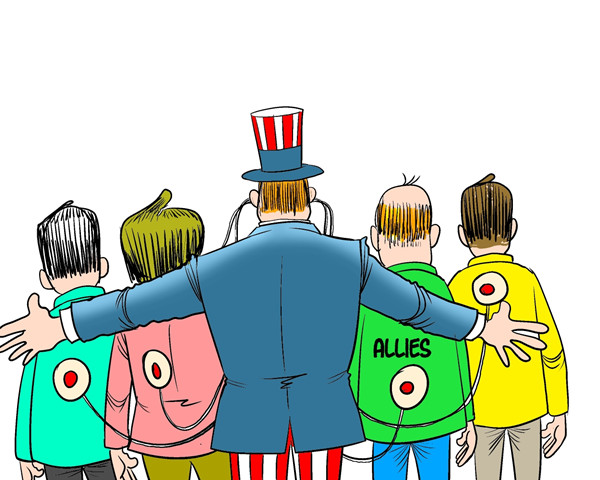No real reform of surveillance
- By Shen Dingli
 0 Comment(s)
0 Comment(s) Print
Print E-mail China Daily, January 22, 2014
E-mail China Daily, January 22, 2014
Unchecked expansion of White House-maneuvered cyber empire is unsustainable and will incur widespread resistance
On Friday, US President Barack Obama made his first substantive speech on the surveillance programs of the US National Security Agency. Although he seems to have accepted a few recommendations of the NSA Review Panel, his proposed reforms of the United States' global surveillance fall far short of being satisfactory, as the White House has failed to address a number of issues.
|
|
|
Allies? All lies! [By Jiao Haiyang/China.org.cn] |
In his speech, Obama made it clear that the US government will continue to collect the communication data of American and foreign nationals, including the interception of communications by foreign government leaders.
The rampant US surveillance targeting foreign nationals and leaders, in the name of American "national security", by intercepting their phone calls, e-mails and text messages - even by setting up data collection centers on foreign territory - are challenges to the national security of the targeted countries.
Obama has argued that other countries are applying double standards when criticizing the US' snooping, as other countries have employed similar intelligence policies against the US. But in reality no other country is as paranoid as the US. To try and deflect some of the disapprobation that its all-pervasive spying has generated, the US has been deftly reflecting it back at others.
Even after Edward Snowden's first leaks, the US was still routinely accusing China of being a threat to the US' cyber security. However, as Snowden has continued to show the extent to which the US is netting data, the entire world is now aware that it is the US' cyber penetration into the realm of others that is the real threat.
The US has tried to justify its actions by claiming that such eavesdropping is essential to fight terrorism, and it has evoked the sense of vulnerability engendered by the terrorist attacks on US soil since Sept 11, 2001. Clearly, it is Washington that is applying double standards. This is hardly conducive to forging constructive interaction between the US and China, which needs to be founded on mutual trust and collaboration to flourish.
And despite the changes Obama promised in his speech, there is likely to be little change in the overarching framework and substance of the US' domestic surveillance programs.






